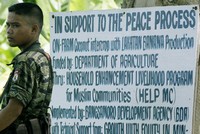In December, the Philippine government and Muslim separatists in the country’s south reached a power-sharing agreement for governing the Muslim-dominated areas on the island of Mindanao. In an email interview, Steven Rood, the Asia Foundation’s country representative for the Philippines and Pacific Island nations, explained what the agreement implies for the economic development of the southern Philippines.
WPR: How integrated are conflicted-affected areas of the southern Philippines with the rest of the national economy, and what impact has the conflict had in terms of economic development?
Steven Rood: After decades of conflict, the economy of parts of the southern Philippines is not very well integrated with the national economy. While there is controversy over whether or not poverty is a root cause of conflict, there is no disputing that conflict causes poverty. So it is only recently that some of the nationwide chains—for example, Jollibee, the Filipino competitor to McDonald’s—have put scattered outlets in some of the urban areas. Rural areas are still quite poor, with the provinces of the Autonomous Region in Muslim Mindanao among the country’s least developed.

